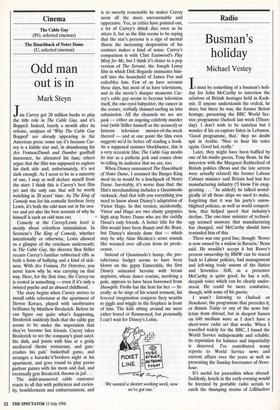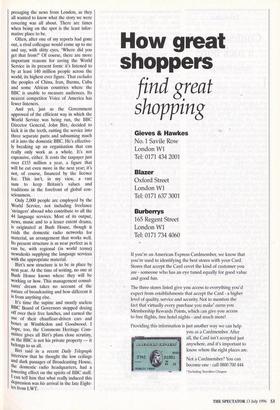Radio
Busman's holiday
Michael Vestey
It must be something of a busman's holi- day for John McCarthy to interview the relatives of British hostages held in Kash- mir. If anyone understands the ordeal, he does; but there he was, the former Beirut hostage, presenting the BBC World Ser- vice programme Outlook last week (Thurs- day). I don't wish to be tasteless but I wonder if his ex-captors listen in Lebanon. `Good programme, that,' they no doubt spit in Arabic. 'Nice to hear his voice again. Good lad, really.'
Later, they might have been baffled by one of his studio guests, Tony Benn. In the interview with the Margaret Rutherford of British politics (Berm and the late actress were actually related) the former Labour Cabinet minister said Britain had lost her manufacturing industry (`I know I'm exag- gerating . ' he added); he talked nostal- gically of all those ships we used to make, forgetting that it was his party's union- blighted policies, as well as world competi- tion, that helped speed that industry's decline. The one-time minister of technol- ogy seemed unaware that manufacturing has changed, and McCarthy should have reminded him of this.
There was one good line, though: 'Rover is now owned by a widow in Bavaria,' Benn said. He wouldn't accept it but Rover's present ownership by BMW can be traced back to Labour policies, bad management and left-wing trade unions of the Sixties and Seventies. Still, as a presenter McCarthy is quite good; he has a soft, deepish voice which can be clearly under- stood. He could be more combative, though, with some of his guests.
I wasn't listening to Outlook or Newshour, the programme that precedes it, or Britain Today or any of the news bul- letins from abroad, but in deepest Sussex on 648 medium wave as I don't have a short-wave radio set that works. When I travelled widely for the BBC, I found the World Service indispensable and reliable; its reputation for balance and impartiality is deserved. I've contributed many reports to World Service news and current affairs over the years as well as presenting the Sunday forerunner of News- hour.
It's useful for journalists when abroad. Suddenly, hotels in the early evening would be forested by portable radio aerials to catch the thumping strains of Lilliburlero presaging the news from London, as they all wanted to know what the story we were covering was all about. There are times when being on the spot is the least infor- mative place to be.
Often, after one of my reports had gone out, a rival colleague would come up to me and say, with slitty eyes, 'Where did you get that from?' Of course, there are more important reasons for saving the World Service in its present form: it's listened to by at least 140 million people across the world, its highest ever figure. That excludes the peoples of China, Iran, Burma, Cuba and some African countries where the BBC is unable to measure audiences. Its nearest competitor Voice of America has fewer listeners.
And yet, just as the Government approved of the efficient way in which the World Service was being run, the BBC Director General, John Birt, decided to kick it in the teeth, cutting the service into three separate parts and subsuming much of it into the domestic BBC. He's effective- ly breaking up an organisation that can really only work as a whole. It's not expensive, either. It costs the taxpayer just over £155 million a year, a figure that will be cut even more in the next year; it's not, of course, financed by the licence fee. This isn't, in my view, a vast sum to keep Britain's values and traditions in the forefront of global con- sciousness.
Only 2,000 people are employed by the World Service, not including freelance `stringers' abroad who contribute to all the 44 language services. Most of its output, news, music and to a lesser extent drama, is originated at Bush House, though it raids the domestic radio networks for material, an arrangement that works well. Its present structure is as near perfect as it can be, with regional (in world terms) newsdesks supplying the language services with the appropriate material.
Birt's new structure is to be in place by next year. At the time of writing, no one at Bush House knows where they will be working or how. This management consul- tants' dream takes no account of the nature of broadcasting and how different it is from anything else.
It's time the supine and mostly useless BBC Board of Governors stopped dozing off over their free lunches, and earned the use of their chauffeur-driven cars and boxes at Wimbledon and Goodwood. I hope, too, the Commons Heritage Com- mittee gives all Birt's plans close scrutiny, as the BBC is not his private property — it belongs to us all.
Birt said in a recent Daily Telegraph interview that he thought the low ceilings and dark passages of Broadcasting House, the domestic radio headquarters, had a lowering effect on the spirits of BBC staff. I can tell him that what really induced this depression was his arrival in the late Eight- ies from LWT.



































































 Previous page
Previous page